September 06, 2017WHAT CONSTITUTES GOOD COMMUNITY-BASED DISASTER RISK MANAGEMENT (CBDRM)? VOICES FROM THE FIELDS OF INDIA, The lecture was delivered by Dr. Subhajyoti Samaddar on 06th September, at Rajgir.
September 11, 2017
Norwegian Ambassador meets Nalanda University Vice Chancellor and Faculty
His Excellency Nils Ragnar Kamsvag, Ambassador of Norway to India meets the Vice Chancellor and later the faculty of Nalanda University over a dinner hosted by the University. During his meeting with the Vice Chancellor, Ambassador Kamsvag remembered the strategic and meaningful partnerships of India and Norway in various sectors, which include research and education, maritime and marine sectors, health and culture etc. The ambassador expressed his willingness to explore possibilities for joint research partnership with Indian institutions, including Nalanda University in the field of hydroelectric power generation and sustainable energy. Ambassador Kamsvag was accompanied by his wife and Mr. Kai Simon Yuen, Second Secretary in the embassy. The dinner was attended by senior Professors and Administrative officers of the University.
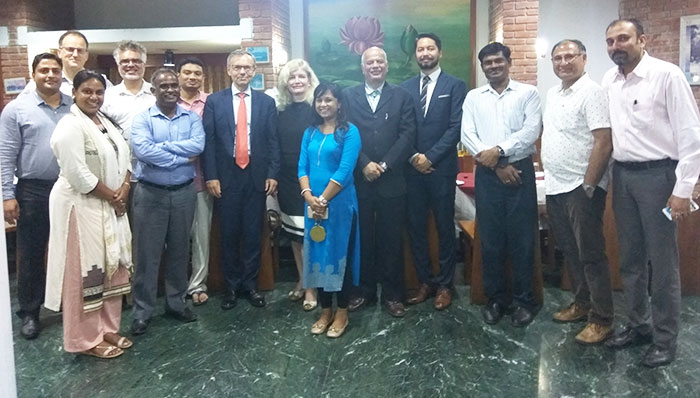
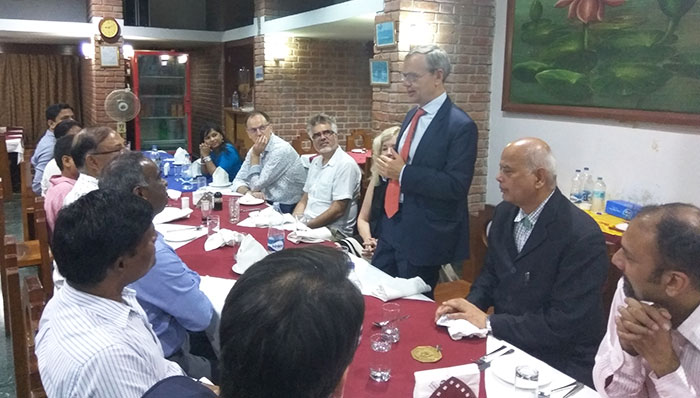
November, 12-13, 2016
September 11, 2017
Nalanda University and Deakin University, Australia organized a one-day workshop on the theme “New Border Crossings: heritage and History in the Vanguard of New Connections” at RICC, Rajgir
School of Historical Studies, Nalanda University and Deakin University, Australia organized a one-day workshop on the theme “New Border Crossings: heritage and History in the Vanguard of New Connections” at RICC, Rajgir on in which four academics from Nalanda University and three from Deakin University participated and presented papers.
November, 12-13, 2016
September 11, 2017
DEAKIN NALANDA ANNUAL LECTURE SERIES
The New Uses of History: Silk Roads, Monsoons and Asian Regional Politics
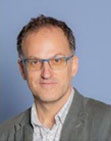
Professor Tim Winter
Research Professor,
Alfred Deakin Institute, Deakin University
Abstract:
One Belt One Road has been described as ‘the most significant and far-reaching initiative that China has ever put forward’. Incorporating 4 billion people and 60 countries, it promises to transform the political, economic and cultural landscapes of Eurasia and Africa over the coming decades. One Belt One Road foregrounds ideas of connectivity, exchange and networks, using the narrative of the Silk Roads- overland and maritime – to establish a narrative of Eurasian ‘shared Silk Road heritage’. This talk focuses on this new imagining of Asia through the Silk Roads, and the implications such a heritage of regionalism, trade and exchange holds in building foundations for cross-border trade and regional security practices. Particular focus will be given to South Asia and the relationship between Belt and Road and Project Mausam.
Brief Bio
Tim Winter is Research Professor at the Alfred Deakin Institute, Deakin University, Melbourne. He is the former President of the Association of Critical Heritage Studies and holds an ARC Future Fellowship on the Silk Roads of the 21st century. He has been a Scholar at the University of Cambridge, The Getty and Asia Research Institute, Singapore and published widely on heritage, development, urban conservation, and the international politics of heritage. His recent books include The Routledge Handbook of Heritage in Asia and Shanghai Expo: an international forum on the future of cities. He is currently working on books on heritage diplomacy in relation to Belt and Road and 20th century conflict in Asia (warinasia.com).
Conclusion Report
Prof. Tim Winter, Research Professor at the Alfred Deakin Institute, Deakin University, Melbourne delivered the second lecture in Deakin-Nalanda Annual lecture Series on the topic “The New Uses of History: Silk Roads, Monsoons and Asian Regional Politics” on September 11, 2017. The lecture focused on new imagining of Asia through the Silk Roads, and the implications on heritage of regionalism, trade and exchange and in building foundations for cross-border trade and regional security practices. Particular focus was given to South Asia and the relationship between Belt and Road and Project Mausam. Prof. Winter’s lecture focused on various perspectives of new imagining of Asia through the Silk Roads and emphasized that by reclaiming the heritage of the Silk Road, the Asian region may play an important role in the cultural and economic life of the global community along with political, economic and cultural transformation of Asia and Africa over the coming days.
Prior to his lecture, School of Historical Studies, Nalanda University and Deakin University, Australia organized a one-day workshop on the theme “New Border Crossings: heritage and History in the Vanguard of New Connections” at RICC, Rajgir on in which four academics from Nalanda University and three from Deakin University participated and presented papers.
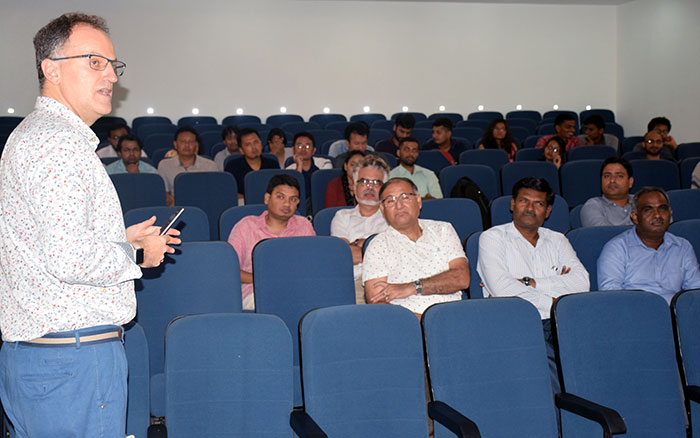
Prof. Tim Winter delivering the lecture
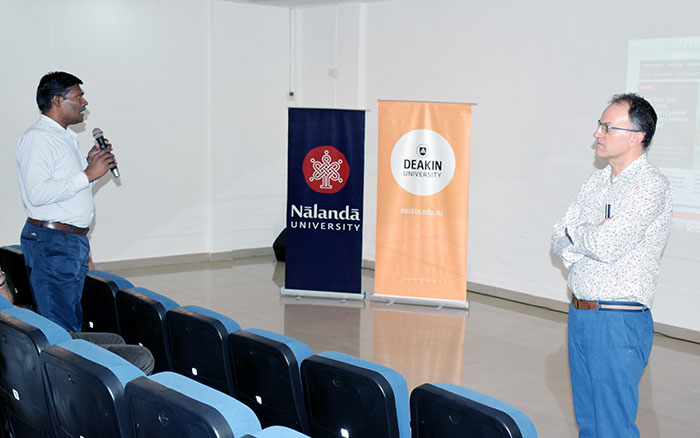
Interaction with Prof. Winter
November, 12-13, 2016
September 06, 2017
What Constitutes Good Community Based Disaster Risk Management (CBDRM)? Voices from the Fields of India

Dr. Subhajyoti Samaddar
Disaster Prevention Research Institute
Kyoto University, Japan
Abstract:
Community participation in disaster risk management is acknowledged by researchers and practitioners, yet its actualization largely remains a dream. In principle, there have been several claims in favour of adopting community participation, albeit these remain anecdotal without empirical substance. The few apparent success stories are seldom scaled up or replicated, compelling most enthusiastic practitioners and planners become sceptical about the use of public participation concept in disaster management strategies. On the other hand, the impression of community based climate change adaption programs to the community becomes nothing more than a trap to circumvent the local communities to get sanctioned some plans, actually encoded by the external agencies. The reason is that participation is not a simple, straight forward notion. Under the circumstances, the defined criteria for successful community based disaster risk management, by and large, become the bonafide property of researchers and planners, and not the actual participants and beneficiaries. If the community’s participation in disaster risk management needs to be enhanced, it is critical to explore how stakeholders or local communities conceptualize and idealize community participation. But in disaster risk management and climate change adaptation studies, no such initiative has ever been made. This study aims to identify local communities’ perspectives on effective ways, steps and factors for ensuring effective community participation in disaster management and climate change adaptation programs and projects based on a case study from flood affected communities in Mumbai, India.
Brief Bio
Subhajyoti Samaddar is an Associate Professor in Disaster Prevention Research Institute (DPRI), Kyoto University, Japan. His research interests are household preparedness behavior, disaster risk communication, risk governance and implementation science. He has an interdisciplinary academic background including PhD in disaster management from Kyoto University, Japan and Master of Planning from School of Planning and Architecture (SPA), New Delhi. He has been involved in different international research projects funded by JICA and JST on disaster risk management and climate change adaptation. Dr. Samaddar has conducted in-depth field studies in different countries including India, Bangladesh, Japan, Ghana and recently in Egypt under different disaster risk contexts such as flood, earthquake, water salinity and climate change induced risks. He is the recipient of international award “Hazards 2000” in 2016. He is the secretariat member of GADRI (Global Alliance of Disaster Research Institute) and co-editing GADRI two book series on Build Back Better and Social Risk of Disaster. He has published several papers in premier international journals on disaster risk studies.
Conclusion Report
Dr. Subhajyoti Samaddar visited University to share his view point on Community partnership during the disaster and how the disaster’s after effects can be curbed through Disaster Risk Mitigation through the various processes. Professor G. J. Chakrapani (Dean of School of Ecology and Environment Studies) welcomed and introduced Dr. Samaddar to the audience. The talk was focused on his research work done in the fields of Dharavi and Bhuj, where due to uneven and mismanaged urbanisation rippled the effect of the earthquake causing havoc. He put forth the idea of minimising the disaster impact through adaptation and mitigation process based on location specific opportunities and risks.
He emphasised upon the effectiveness of community participation strategies during and before the calamity through making such structures so that it could sustain or minimise the impact. In the end, he emphasised upon the social consciousness, community participation, public and private stakeholder’s role including the role of media to deliberately handle the issue in such troubled water times. Dr. Samaddar was felicitated with a memento by Dr. Prabhakar Sharma and thanked by the administration for his inspiring thoughts on the topic.
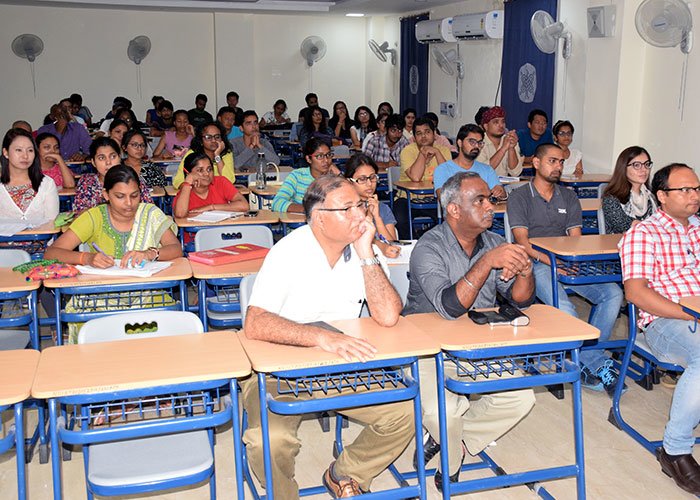
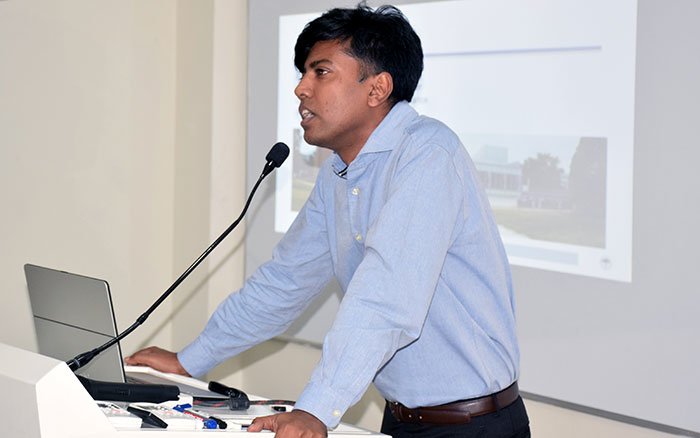
Dr. Subhajyoti Samaddar addressing the audience at Nalanda
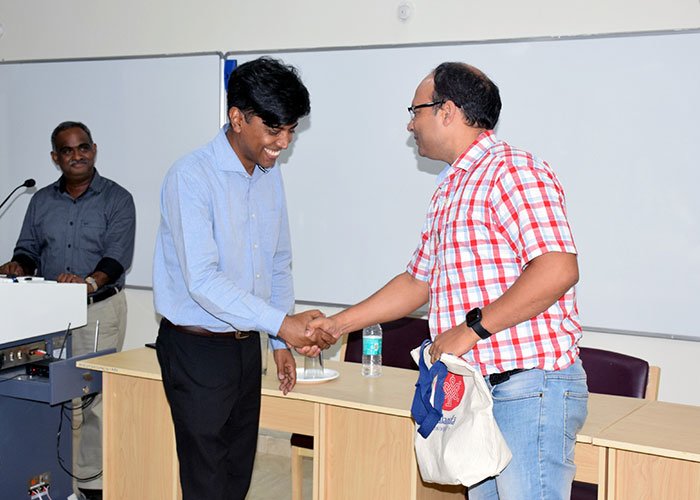
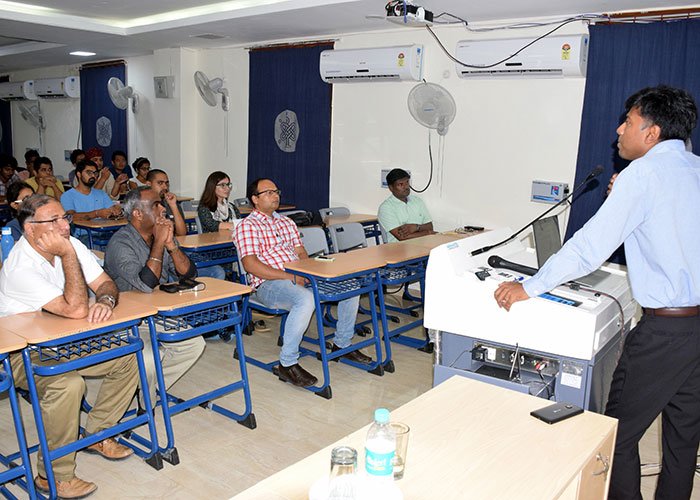
November, 12-13, 2016
September 02, 2017 (Saturday)
Enhancing scientific collaboration between Nalanda and Institutions in EU
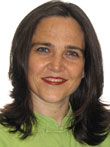
Ms. Ainhitze Bizkarralegorra Bravo
EURAXESS India Country Representative
Abstract:
EURAXESS (European Commission Research Portal) – Researchers in Motion is a unique pan-European initiative delivering information and support services to professional researchers. Backed by the European Union and its Member States, it supports researcher mobility and career development, while enhancing scientific collaboration between Europe and the world.
EURAXESS is also your gateway to Science4Refugees, a Commission’s initiative helping refugee researchers find suitable jobs in today’s challenging research landscape. Part of the initiative, is the Science4Refugees Research Buddies, supporting refugee scientists in finding European researchers to discuss problems, find solutions and study together, by matching their research field, scientific studies and interests.
Brief Bio
Ainhitze Bizkarralegorra Bravo is a lawyer by training working as EURAXESS India Country Representative. She studied law and economics at University of Deusto (Bilbao, the Basque Country) and University of Liège (Belgium).
She has over fifteen years of experience in management of European Commission funded projects, including professional experience and time in India with the EU Delegation in this country. Before joining the European Commission, she worked for the European Human Rights Foundation. She has also served as vice-president for EU affairs and Bureau member for human rights and equality of the European Youth Forum. She has been active in other NGOs too.
Thankful to the different exchange programmes that she has been part of, Ainhitze uses every opportunity to promote intercultural and educational exchanges.
She is passionate about social transformation, international cooperation and the European Union as so far the most stable known peace project set up by a community of countries.
Conclusion Report
The session started with Dr Pushpakumar Laxmanan, welcoming the guest. The guest, Ms. Bravo presented her organization, Euraxess India to the audience and made them aware about the research, funding and fellowship opportunities available at the institutions in the European Union. While doing so, she mentioned about some of such prestigious programmes/grants/fellowships, e.g. Horizon 2020, European Research Council Grants, Marie Sklodowska-curie Fellowships, Erasmus+ and Euraxess – Researchers in Motion.
Dr. Kishore Dhavala, Faculty at Nalanda, shared his European experience facilitated through Euraxess India
The discussion at the end of the session was centred on the possibilities that could be facilitated by Euraxess India to Nalanda community members for collaborating with the institutions in European Union countries.
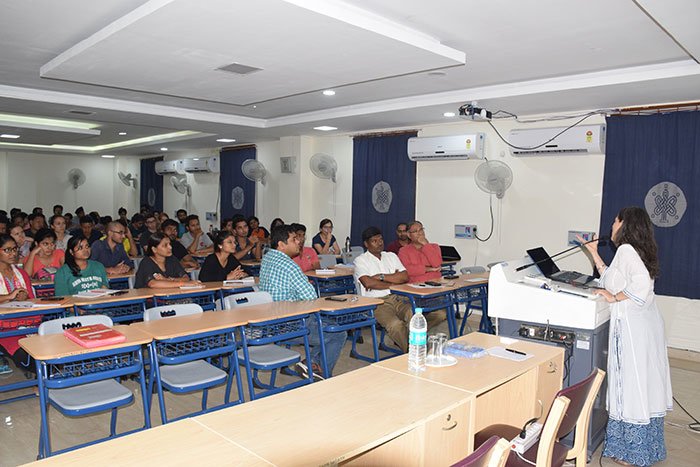
Ms. Ainhitze Bizkarralegorra Bravo conducting the information sees at Nalanda
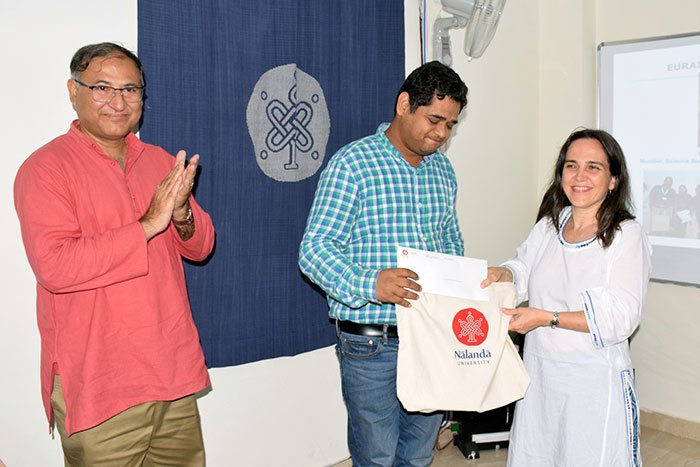
Dr Somnath Bandyopadhyay and Dr. Kishore Dhavala presenting token of thanks to Ms Bravo
November, 12-13, 2016
August 24, 2017
Understanding Development Crises
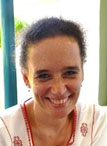
Dr. Maria Luisa Eschenhagen
Universidad Pontificia Bolivariana, Medellín Colombia
Abstract:
The central causes of the environmental problems, in most of the places around the world are such as large-scale mining, agroindustry, deforestation, dam constructions and with it the losing of biodiversity and water scarcity, can be found in the model of the neoliberal development. A development idea, which is based on accumulation, without regards of social justice neither nature. This also is known and not new, and there are initiatives such as the sustainable development, which was proposed since 1987 with the Brundtland paper and instrumentalized with the Agenda 21 from Río 1992. Sustainable development which can be understood as an alternative of development. But although more than 20 years after that, there are no really substantial perspectives of a better situation of the environment.
Because of that, there are many and very different movements proposing alternatives to development, this means to go beyond development itself. So, in history it could be seen the movement of Gandhi (Swaraj and Satyagraha) as well as proposals from Bolivia and Ecuador is the sumak kawsay from the indigenous Cosmo vision, which has given new incentives. But also, buddhism can give important incentives to think development in a different way.
Brief Bio
Maria Luisa Eschenhagen has worked for twenty years as a research professor in various universities and faculties across Colombia, and for the last six years at the Universidad Pontificia Bolivariana in Medellín. Her main research interests lie in the field of environmental studies: environmental thought, environmental education, development and environment, and ecological politics. Her two main research areas environmental education in universities and alternatives to the development paradigm. She is deeply concerned with epistemological and ontological dimensions of the transition to sustainable societies and in alternative cosmovisions, including Sumak Kawsay and Buddhism.
Conclusion Report
Professor Maria Luisa Eschenagen from the University of Colombia was welcomed by Dr. Aviram Sharma, faculty at the School of Ecology and Environment Studies. She addressed issues on development model adopted by various “developed” and “developing” countries with special reference to Colombia. The talk circled around how the notion of development has led to the loss of biodiversity, some even irrevocable beyond a point. The developing country faces the brunt of development as resources are exploited which lead to guerrilla warfare between the government and people trying to protect the territory and resources at large. She briefed students about the flora and fauna of Colombia and how much the Latin American country has lost in the race of development due to erratic consumption patterns of environmental resources. She concluded with stating how development model has been a source of plundering the environment of its purity and bringing it to the threshold levels because of anthropogenic needs.
At the end of the session, the floor was opened for questions, followed by a healthy debate on the ways in which development and environmental protection can go hand in hand. Dr. Aviram Sharma concluded the talk by sharing his views on the same topic. Prof. Maria was felicitated with the memento of gratitude and the audience thanked her for sharing her point of view on the topic.
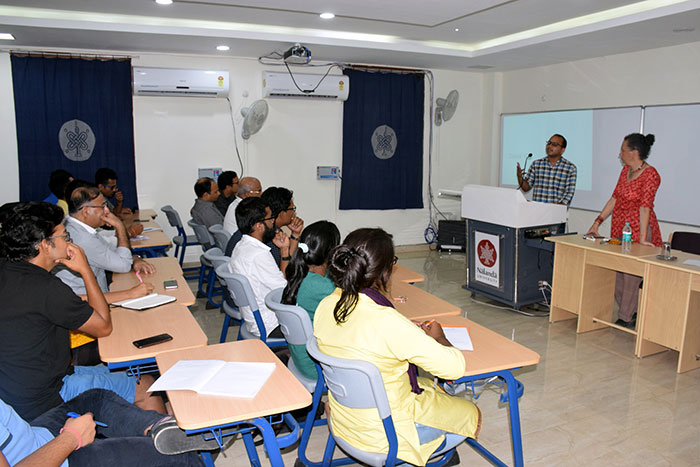
Dr. Aviram Sharma introducing the students to Dr. Maria
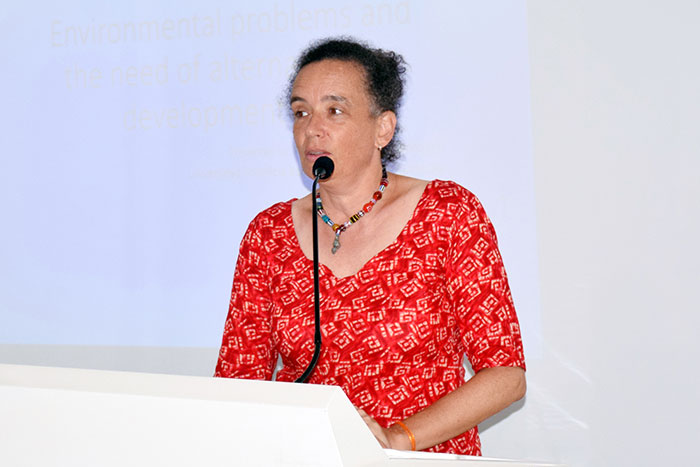
Dr. Maria addressing the audience
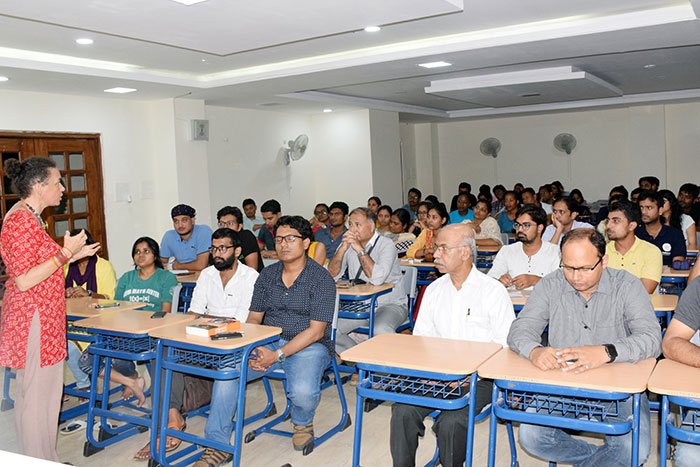
Interaction with the students
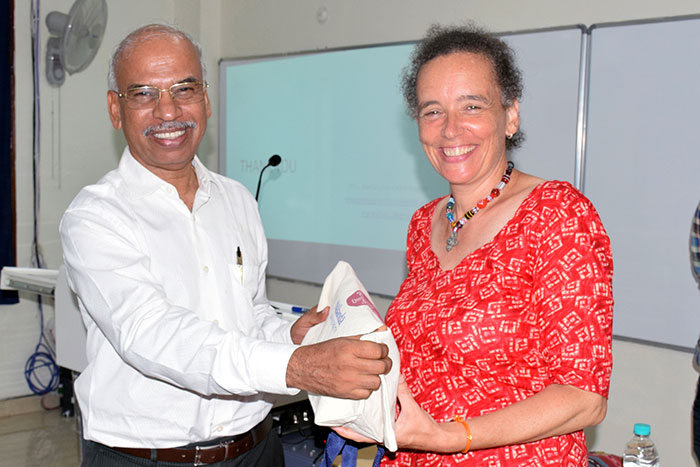
Prof. B Mohan presenting token of thanks to Dr. Maria
November, 12-13, 2016
June 23rd 2017 (Friday), 5.00pm
Information Session on Admissions
Information Session on Admissions, for prospective candidates, was held at the University’s Delhi office on 23rd June at 5 pm.
November, 12-13, 2016
April 26th 2017 (Wednesday), 5.00pm
Information Session on Admissions
Information Session on Admissions was held at the University’s Delhi office on 26th April at 5 pm.
November, 12-13, 2016
April 13, 2017 (Thursday), 5.30pm, Classroom No-01, Interim Campus of the University
SEES Distinguished Lecture- Disaster vs. Sustainable Development by Bio-Engineering Measures by Professor Chandan Ghosh, Professor and Head, Geo-Hazard Risk Management Division, National Institute of Disaster Management, New Delhi
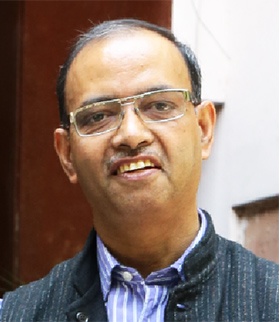
Abstract
More than half of India’s cropland is losing productivity because topsoil is being washed or blown away faster than natural forces can replace it. Reducing the topsoil layer means reducing plants’ access to essential soil nutrients and water. For at least the next decade environmental issues will dominate the agricultural and natural resource sectors. Already the focus of much attention are the problems of deforestation, increased flooding by major rivers, and reduced dry-season water flows for irrigation and urban and industrial supplies. Not enough attention, however, has been given to the massive problem of soil erosion and, more specifically, to the need to reduce soil and water losses caused by excessive rainfall runoff. Changes in farming practices have made the problem worse in recent years. In response to the growing need for grain for exploding human and livestock populations, farmers switched from traditional rotations and multiple cropping to continuous-row cropping, a practice that encourages rainwater to run off the land at a faster and more destructive pace. The present talk deals with, Disaster management scenario of the country from the current perspectives of Natural and man-made disaster, Disaster statistics vs. development paradigm, Chronology of DM initiative since 1994 Yokohama conference to Sendai(2015) followed by AMCDRR (2016) by Government of India, Institutional set up in India since the formation of NCDM (1995) to NIDM (2003), NDMA-SDMA-DDMA, NDRF-SDRF…, Capacity building of stake holders, Sustainable development by Bio-engg measures – examples and case studies in: Harvest Rainwater, Protect Infrastructure, Protect Coastlines, Protect Waterways, Protect Flood-prone Land, Protect Farmland, Sequester Carbon, Facilitate Reforestation and Plantation Establishment, Treat Liquid Wastes etc.
Brief Bio
Prof. Ghosh obtained his B.Tech. degree in Civil Engineering from Bengal Engineering College (IIEST), M.Tech. from Jadavpur University, PhD from IIT Kanpur (1992) and another PhD (2004) from Ibaraki University, Japan. He joined National Institute of Disaster Management, Delhi in 2006. Prior to this, he had worked at Institute of Technology, Banaras Hindu University and at Indian Meteorological Department. His area of expertise are reinforced earth, application of geo-synthetics for landslides, slope stability & erosion control, geotechnical & geophysical exploration, disaster resistant housing technologies, retrofitting and earthquake risk mitigation and management. Since July 2006 he is serving as Prof. & Head, Geohazards Division, NIDM, Ministry of Home Affairs, Govt. of India, New Delhi. He has phenomenal field exposure and professional credence in the disaster documentation such as Leh cloud burst-2010, Sikkim Earthquake-2011, Lalita Park building collapse-2011, Uttarakhand Flood-2013, Seismic Vulnerability assessment by RVS across the country.
In recognition of his seminal contribution, Dr Ghosh received Prof. Leonard prize for the best doctoral thesis in 1993, CIDC Vishwakarma Awards-2013, IGS-Shri H.C. Verma Golden Jubilee Award-2013.
November, 12-13, 2016
March 29, 2017 (Wednesday), 5.30pm, Classroom No-01, Interim Campus of the University
SHS Distinguished Lecture – Trends in South Asian Studies in the United States and Abroad by Professor Wendy Singer, Roy T. Wortman Professor of History and South Asian Studies, Kenyon College, USA

Abstract
In 1956 India signed an agreement with the United States based on a Law—PL480— that provided wheat to India in exchange for payment in Rupees. That money enriched (in both senses of the word) US universities and libraries because they spent it on books, scholarships, and research opportunities in India. A new generation of students began to study Hindi and other Indian languages. The great libraries in Washington and Chicago built collections of books and manuscripts. And for the next decades serious academics travelled to India to live and work and learn in India’s archives, libraries, and highly respected universities. This was a remarkable transformation of American academics.
In this talk, she will examine how this origin to South Asian Studies in the United States created a community of scholars that looked to their Indian professors, mentors, and, eventually, colleagues as the centre of Indian Studies. She will argue that South Asian Studies in the US is uniquely India-based– with constant refreshing from South Asian scholars in the diaspora who travel back and forth–rather than insulated on its own. Therefore, theoretical positions and methodological trends have evolved out of a dynamic relationship between scholars of South Asia based in India and those based in the US. Professor Singer will talk specifically about the trends that have come out of this collaborative relationship and also how this is different from other fields in the US, including East Asian Studies and African Studies.
Brief Bio
Wendy Singer is the Roy T. Wortman Professor of History at Kenyon College in the US. She is an historian of India, whose research focuses on the culture and politics of the post-independence period. Her most recent book Independent India, published by Routledge, is a thematic history that includes documents and images of the period from 1947 to 2000. Borrowing from the study of literature and anthropology, she is especially interested in the challenges of doing history of very recent periods. Her current project is a study of the changing idea and language about “Reservations” in India. Having spent 30 years living and studying in India, she is a member of a number of associations of scholars of South Asia. Through a recent panel at the Association for Asian Studies in the US, she has begun to organize an institutional study of how American scholars—particularly women scholars—have engaged in South Asian Studies. She has lectured in India, the UK, Europe, and the United States about South Asian History, Indian Democracy, and the state of the historical discipline.
November, 12-13, 2016
March 30, 2017 (Thursday), 5.30pm, Classroom No-01, Interim Campus of the University
SEES Special Lecture- Big and Small Tractors, Pumpsets and Transition: The Role of Rural Capital Goods in Green Revolutions in South Asia and Beyond by Professor Stephen D Biggs, Department of Development Studies, University of London, UK.

Abstract
The presentation will look at the role of rural capital goods in agrarian change and rural development over the last 50 years in some South Asian countries. It will look in particular at the spread of smaller engines (up to about 20 hp), that have provided the power for shallow tube wells, low lift pumps, boats, 2 wheel tractors, hullers, transport, etc. and look at the market institutions for custom services. The decline in academic and policy interest in agricultural and other forms of rural mechanization over the last 40 years will be looked at in the context of recent renewed interest in policies and projects influencing patterns of rural mechanisation and industrialisation.
Brief Bio
Professor Biggs is a Research Associate at the Department of Development Studies, School of African and Asian Studies, (SOAS), University of London. UK. He obtained his PhD in Agricultural Economics from University of California, Berkeley, USA. Professor Biggs held various positions in the past like Home based Fellow at Institute of Development Studies (IDS), University of Sussex, Programme Officer, Ford Foundation, Dhaka, Bangladesh. Regional Economist for CIMMYT, based in Delhi. He also served as Senior Lecturer, School of Development Studies, University of East Anglia, Norwich, UK and Visiting Scientist, ICIMOD, Kathmandu etc. Professor Biggs has several publications like papers in international journals and books to his credit.
November, 12-13, 2016
March 27, 2017 (Monday), 5.30pm, Basement Hall, RICC, Rajgir
SEES Distinguished Lecture – Harnessing the Heritage in Shaping the Future by Professor Krishnamurthi Ramasubramanian, Department of Humanities & Social Sciences, IITB, Mumbai
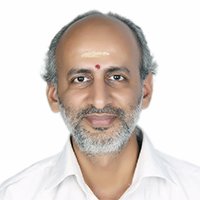
Abstract
By presenting an overview of some of its past scientific heritage, and also discussing some of the methodological issues, we will try to see how we can march into the future with a completely open inquiring mind to seek the truth rather than getting caught in several skirmishes, which would in fact be defeating the very essence of education.
India has had a long, rich and hallowed intellectual tradition and technological heritage, as exemplified by the various forms of arts and architecture, forts and canons, dams and water catchments, string and percussion instruments, as well as from the sophisticated techniques employed by them in handling various mathematical, and astronomical problems involved in the computation of lunar and solar calendars. Currently however, she seems to be undergoing a phase marked by loss of self- esteem and pride that gets manifested in several forms. This could possibly be an outcome of the lack of awareness of her own riches, as well as the subtle effects of colonization of her mind for centuries. Being unsure of what to claim and why, many of us keep swerving between two extremes – complete defensiveness to mindless aggressiveness.
Brief Bio
Professor Ramasubramanianan holds a doctorate in Theoretical Physics, a Bachelors in Engineering, and a Masters in Sanskrit. For completing a rigorous course in Advaita Vedanta (a 14 semester program) he was honored with the coveted title “Vidvat Pravara” by the Shankaracharya of Sri Sringeri Sharada Peetham in the year 2003.
In 2008, he was conferred the prestigious Maharshi Badarayan Vyas Samman by the President of India in recognition of his scholarship as well as the outstanding research work done by him to the process of synergy between modernity and tradition.
November, 12-13, 2016
March 23, 2017 (Thursday), 5.pm, Classroom No-01, Interim Campus of the University
SHS Distinguished Lecture- Deciding Who Counts: Hindus and Muslims in the Indian Census by Professor Peter Gottschalk, Professor of Religion, Wesleyan University, USA

Abstract
While a government may consider census operations as an effort to take a demographic snapshot of its citizenry, it implicitly helps shape the identities of individuals and their understanding of their nation. India’s two centuries of subjugation to European imperialism transformed the way Indians viewed themselves and proved influential over the last seventy years of politics in independent India. The questions that governments choose to include in their censuses are not self-given. And so, those chosen reflect the government’s perspectives about the major social categories that influence social stability and governance. Historically these questions imply assumptions about not only the sub- categories that make up categories such as race, religion, gender, or class, but also about the nature of social categorization and belonging itself.
Brief Bio
Peter Gottschalk is Professor of Religion at Wesleyan University. His scholarship concentrates on the dynamics of cultural interpretation at the intersection of Muslim, Hindu, Christian, and secular traditions, especially in South Asia, the U.K., and the U.S. He is interested particularly in exploring the roles of comparison and categories in how communities understand the world and define in- and out- groups. Most recently, Professor Gottschalk has published Religion, Science, and Empire: Classifying Hindus and Muslims in British India and American Heretics: Catholics, Jews, Muslims, and the History of Religious Intolerance.
November, 12-13, 2016
February 24, 2017 (Friday), 5pm, Classroom No-01, Interim Campus
SEES Distinguished Lecture – Plants, Society & Law by Professor Kanchi N. Gandhi, Senior Nomenclatural Registrar, Harvard University, MA, USA
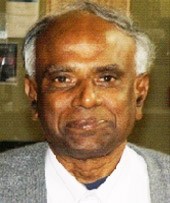
Abstract
Plant species, unless adapted to particular habitats, are not confined to geographical borders of a country. Laws of a country may prevent the introduction of invasive alien species, regulate the shipment of nursery and greenhouse plants, and minimize the impacts that invasive species might cause. Knowledge of species concept and of plant morphology, physiology, and reproductive strategy are essential to understand the ecology and environment of plants and to consider the regulation of plants for commercial use. The topics presented will include basic concept of root (Banyan tree), stem (ginger and potato), leaves (box-holly), flowers (Poinsettia & Rafflesia), fruits (apple and rice), and movement (Venus flytrap); the legal and/or economic issues pertaining to coconut (Cocos nucifera) “congress weed” (Parthenium hysterophorus), dhatura (Datura), halophytes (Salicornia), orange-jasmine (Murraya paniculata), opium (Papaver somniferum); and tea (Camellia sinensis). U.S. court cases on marijuana (Cannabis sativa) and tomato (Solanum lycopersicum), will also be discussed. Etymologies of plant names are usually meaningful (e.g., ginger, hollywood, jackfruit, rice), but exceptions exist (e.g., Chinese apple, Indian apple, Pomegranate). Are species-based patents affected when the names of the relevant species change?
Brief Bio
Professor Gandhi is Senior Nomenclatural Registrar at Harvard University Herbaria, USA. He has expertise in the areas of plant nomenclature, plant morphology, and plant taxonomy. Professor Gandhi has rich experience in teaching, curation of vascular plant specimens and field study in the tropical, subtropical and temperate regions. He has substantial knowledge on the floras of southern India and southern United States. Professor Gandhi has been involved in several projects in analyzing plant nomenclature for the international community; he is currently working on International Plant Name Index, the HUH lookup tables, and Flora of North America projects. He serves as a Nomenclature Editor for Taxon, Rhodora, and Flora of North America, as a Collaborator for the Index Nominum Genericorum – Plantarum, a member of the Nomenclature Committee for Vascular Plants-IAPT and of the Code By Laws Committee-IAPT, and also as the Manager and Editor for the International Plant Name Index at Harvard. Professor Gandhi is also the recipient of “Distinguished Service Award” from the American Society of Plant Taxonomy in 2010.
November, 12-13, 2016
February 17, 2017 (Friday), 5.30pm, Basement Hall, RICC
SEES Distinguished Lecture – Green Building Movement in India by Mr. S Raghupathy, Deputy Director General, Confederation of Indian Industry (CII)
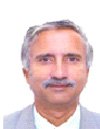
Abstract
CII has always been in the forefront in offering the latest and emerging services to Indian industry. A step towards this direction was triggering the 21st century modern green building movement in India. The journey which Indian Green Building Council (IGBC), part of CII embarked in early 2000 was inspiring & fulfilling and it continues to be so.
Today, India with over 4.48 billion sq.ft stands no: 2 in the world in terms of registered green building footprint. IGBC envisions that the place we live, work, study, play, commute…should go the green way and green should become a way of life.
One of the major reasons for this growth path was the fact that, IGBC could convert every challenge into a new growth opportunity and in the process transformed it into a robust National movement. A clear business case was demonstrated by IGBC. This presentation highlights the strategies and the inspiring green growth path adopted by IGBC in facilitating a greener and healthier India.
Brief Bio
Mr. Raghupathy is the Deputy Director General of Confederation of Indian Industry (CII). He is also the Head of 4 CII Centres of Excellence -Green Business Centre, Institute of Logistics, Centre for Competitiveness and Water Institute. He is a Gold Medalist in Chemical Engineering from Annamalai University (1976-81). Mr. Raghupathy has 32 years of work experience in the areas of – energy management, green buildings, water management, waste management, renewable energy and urban landscaping. He was selected as “National Expert – Energy Conservation” for the prestigious UNDP- Government of India energy audit project. It was under his leadership, CII-Godrej GBC building gained the unique distinction of becoming India’s first Platinum rated Green Building in 2004. As part of IGBC, he was instrumental in triggering the National green building movement. Under his leadership, IGBC has catalysed over 3,900 projects, amounting to 4.48 billion sq.ft of footprint, thereby making India the 2nd country in the world in terms of largest registered green building footprint. India is one of the founding members of WorldGBC and Mr. Raghupathy has been representing India, right from its inception in 2002.
November, 12-13, 2016
February 10, 2017 (Friday), 5pm, Lecture Hall No-01, Ajatshatru Residential Hall
SEES Weekly Lecture – Water and Sacred Spaces: A Case Study of the Ellora-Khuldabad-Daulatabad Region by Dr. Yaaminey Mubayi, Visiting Faculty, School of Planning and Architecture, BML Munjal University, Haryana, India
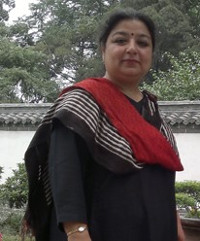
Abstract
Water as an essential resource for the evolution of human settlements throughout history, has thus far escaped the attention of scholars of history in South Asia. Contemporary research relating to the subject largely involves the examination of policy frameworks governing access to and distribution of water resources on the one hand, as well as fixating on the colonial period as a “watershed” dividing pre-modern water management systems from colonial and post-colonial policies seeking to control the use of water by communities. Both perspectives view the actual element, its presence in nature and forms of access by human agency, in an instrumental manner, reducing it to “fit in” as it were, into pre-determined political and disciplinary frameworks and arguments.
This paper offers a different perspective to the study of water and human history. It focuses on a historically settled and culturally active region of South Asia, i.e. Ellora-Khuldabad-Daulatabad in the Marathwada region of the Indian Deccan Plateau. It seeks to examine the ecological features of the region as underpinning the historical and cultural development of the political, socio-economic and cultural systems intrinsic to the area. Ellora-Khuldabad-Daulatabad, lying within a 10 km radius in Aurangabad district, are richly populated by historic sites such as the Ellora Cave complex, a UNESCO World Heritage Site, Daulatabad Fort as also numerous smaller temples, pilgrimage centres, ashrams, Sufi dargahs and historic tanks (kunds). The theme for the region is set by the numerous water features, streams, rivulets, man-made reservoirs, temple tanks and historic state-sponsored waterworks. The micro-watershed of Khuldabad Taluka, within which the study area is located, provides an appropriate context for the evolution of human settlements in the region since pre-historic times.
Brief Bio
Dr. Mubayi is a Historian and Social Development Professional with twenty years of experience in the field of Cultural Heritage Studies. With an interest in fieldwork-based applied learning as her core motivation, she has combined research and institutional experience with academic practice and forged an innovative professional niche in the area of Cultural Heritage and Development Planning. Dr. Mubayi completed her Undergraduate degree in South Asian Studies from Mount Holyoke College, Massachusetts, USA and her Masters, M.Phil and Ph.D in History from Jawaharlal Nehru University, New Delhi. She has specialized in the niche sector of Cultural Heritage where her skills and training in the disciplines of History as well as Development have been utilized. She is currently teaching at the Department of Conservation Studies, School of Planning and Architecture, Delhi and the BML Munjal University, Gurgaon. She has worked with a number of organizations including international multi-laterals like UNESCO, the World Bank and ADB, private sector foundations and state and central government bodies like the Archaeological Survey of India and Ministry of Culture, Government of India. Her work in these organizations has primarily involved policy, planning and advisory initiatives related to community development, local history and oral traditions.
November, 12-13, 2016
February 07, 2017 (Tuesday), 5pm, Lecture Hall No-01, Ajatshatru Residential Hall
SHS Distinguished Lecture – Indonesia and Greater India: Scholarly and Religious Knowledge Networks and Moral Geographies, 1880s-1990s’ by Dr. Marieke Bloembergen, Senior Researcher, KITLV – Royal Netherlands Institute of Southeast Asian and Caribbean Studies, Leiden, Netherlands
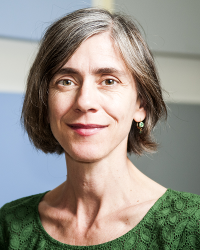
Abstract
India, or Greater India was never far away for members of a generation of Indologists coming from Europe, and working in what is today South Asia, mainland Southeast Asia, and the Indonesian archipelago. Greater India was also palpable for the new Buddhist revivalist movement since the late nineteenth century, as well as for the members of the international Theosophical Society – founded in 1875 in New York, soon with its headquarters in Adyar (India), and with its own peculiar forms and members elsewhere in Asia. If we move further in time, across decolonization, we will encounter an ongoing query of scholars, gurus, and spiritual seekers following the trail to that Greater India, from Tagore in the 1920s, to the Beatles and the hippies – and hippie-scholars – in the 1960s and 70s, seeking to capture the history or essence of Asian culture(s), religions and/or spirituality. In this lecture, she will discuss work-in-progress of her ongoing project on ‘Indonesia and Greater India. Scholarly and religious knowledge networks and moral geographies, 1880s-1990s’. In this project, she explores, for the period 1900s-1980s, how, why and for whom, in Asia, Europe and the US, a predominant Islamic Indonesia became situated in ‘moral geographies of Greater India’ – or: moral and geographical imaginations of Asia as defined by one Hindu-Buddhist civilization, with its origin in India, and perceived to be superior to others.
Brief Bio
Marieke Bloembergen is senior researcher at the Royal Netherlands Institute of Southeast Asian and Caribbean Studies in Leiden (KITLV). She has published a monograph on the Netherlands Indies at world exhibitions (2006) and on the history of policing in the Dutch East Indies (2009). She has recently finished a large joined research project (with Martijn Eickhoff, NIOD) on the local, inter-Asian and global dynamics of archaeology and heritage politics in colonial and postcolonial Indonesia, resulting in several articles and a book manuscript to be submitted. Her research interests include the political dynamics of knowledge production, and biographies, histories and memories of (post-) colonial policing in (post-) colonial Indonesia, in a widening, inter-Asian and global context.
November, 12-13, 2016
January 30, 2017 (Monday), 5pm, Lecture Hall No-01, Ajatshatru Residential Hall
SBS Special Lecture- In Search for a New Orthodoxy: the Middle Path of Kalacakra by Dr. Francesco Sferra, Associate Professor, University of Naples “L’Orientale”, Rome, Italy
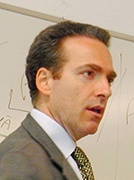
Abstract
In order to effectively meet the new socio-cultural challenges that had arisen around the eve of the second millennium (first of all the Islamic invasion in the Northern India and the revival of the Brahmanical traditions), the first authors of the Kālacakra sought to establish, within a consistent framework, a new Buddhist orthodoxy and to close the Buddhist ranks around the undisputed authority of the monastic community. With a particular emphasis on doctrines, the lecture will examine the strategies adopted by the first Kālacakra masters (in particular Puṇḍarīka, Vajrapāṇi and Vajragarbha, and those active in Nalanda and Vikramashila such as Nāropā and Abhayākaragupta) in order to define and characterize Buddhist Tantrism as a whole and in particular the Kālacakra school in comparison with other Buddhist and non-Buddhist traditions.
Brief Bio
Francesco Sferra is Associate Professor of Sanskrit language and literature at the University of Naples “L’Orientale” since 2002. In January 2014 he has got the “National Scientific Qualification” to the Full Professorship. Member of several scientific societies, including the Bhandarkar Oriental Research Institute (Pune, since 1995), the Société Asiatique (Paris, since 1996) and the Pali Text Society (Oxford, since 2003), Sferra is part of the Academic Board of the Rivista di Studi Sudasiatici (Rome), the Journal of Tantric Studies (Hamburg) and the Journal of the Japanese Association for Indian and Buddhist Studies (Tokyo). Teacher of Sanskrit in Naples since 1998-99, in 2007 and in 2011-2012 he was a visiting professor (Numata-Professor für Buddhismuskunde) at the Asien- Afrika- Institut (University of Hamburg). Among his major publications are the edition of the Sanskrit text and English translation of the Ṣaḍaṅgayoga by Anupamarakṣita with the commentary by Raviśrījñāna (Rome 2000) and the critical edition of the Sanskrit text of the Paramārthasaṃgraha by Nāropā (Rome 2006). He is the author of essays on linguistic speculations of some Hindu religious-philosophical schools (1991, 1994, 2007 and 2010). His research focuses also on Indian tantric traditions, including Kashimr Shaivism, the Viṣṇuite tradition of Pāñcarātra and the Buddhist Kālacakra.
November, 12-13, 2016
January 28, 2017 (Saturday), 4pm, Lecture Hall No-01, Ajatshatru Residential Hall
Nalanda Distinguished Lecture- Christian Missionaries and Faith-Based Development Aid in India, 1960s-2000s by Professor Idesbald Goddeeris, Professor of History, University of Leuven, Belgium
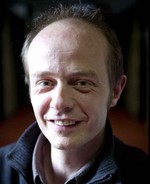
Abstract
Faith-based development aid evokes varied reactions. It arouses suspicion in our age of secularization and postcolonial sensitivity, but it also has its advocates, who for instance, emphasize that religion is an important aspect of people’s daily lives worldwide, especially in those areas where development practitioners are active. The current project aims to explore the particularities of Christian development aid, analyze how they evolved in the post-war period, and understand if and how they played a part in its effectivity. It will pay particular attention to the colonial legacy of Christian development aid and to its continuity and discontinuity with what Edward Said called the ‘civilizing mission’. These topics will be addressed via the case of Ranchi, the capital of the Indian state of Jharkhand and one of the most important centers of Belgian missionary activity. The project will investigate the ideas and practices of Belgian missionaries and their Indian collaborators and successors, and study the present-day relevance of their work by analyzing the perceptions of local communities, including both target groups (Christians, tribals) and outsiders (Hindus, Muslims). This interdisciplinary approach, focus on the postcolonial era, and attention to the multi-religious environment are important innovations in missionary history.
Brief Bio
Idesbald Goddeeris is a Slavist and a historian. He teaches courses on colonial history, history of Poland, and history of India, and is also Director of the History Program. His research mainly focuses on the relationship of our society with other cultures and political regimes. He particularly examines this by means of the history of migration, European identities, transnational social movements, East-West and North-South contacts, communist secret services during the Cold War, development aid, and postcolonial memories. He was a visiting fellow at the London School of Economics (2009) and the University of Pennsylvania (2014), and recently also lectured at the universities of, inter alia, Delhi, Mumbai, Kinshasa, Krakow, Irkutsk, and Kolkata. He is also a senior member of the Leuven Centre for Global Governance Studies, where he coordinates the Leuven India Focus, and is an Expert in the Commission ‘History and Archaeology’ at the Foundation for Scientific Research (FWO- Vlaanderen).